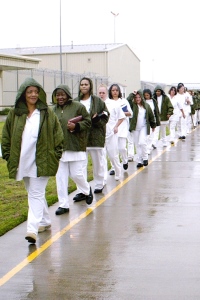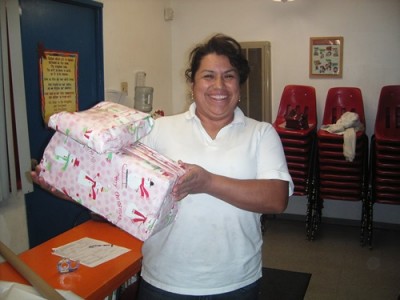Find out how ministry to women in prison differs from ministry to men.
Since 1985 the population of female prisoners in the U.S. has risen at nearly double the rate of males. Because women prisoners have historically been fewer, corrections policy has often not taken gender-specific needs into account.
But today's experts in rehabilitation recognize that female prisoners often have different needs than male prisoners. By learning about the issues specific to women behind bars, volunteers can respond to them more effectively.
THE WALKING WOUNDED

"Many women have traumatic and abusive pasts that they need to share," says Janet McLaughlin, a retired Missouri school teacher and Prison Fellowship® volunteer.
While many prisoners of both genders have abusive pasts in common, incarcerated women have a greater statistical likelihood of experiencing physical and sexual trauma. The resulting pain often helps drive them into the most frequent convictions for women: substance abuse and property crime to support addictions.
Without programs that specifically target women's abusive pasts and show them what healthy relationships look like, female prisoners risk getting trapped in a habitual revolving door of recidivism. Programs such as Celebrate Recovery are helpful because they target prisoners' addictions and behaviors, as well as the hurts that frequently underlie them.
Volunteers facilitating women's programs can expect female participants to be more verbal and open to sharing their thoughts and emotions than men. Women are also more comfortable with seeking the support of others around them.
"They want somebody to hear them. They want somebody to love them," says Lisa Thomas, another Prison Fellowship volunteer. "The men respond to that also, but women are willing to get down to the exact nature of what's going on a lot quicker."
KEEPING THE PEACE
 Incarcerated women may also face difficult relationships with other female prisoners. These problems can stem from a variety of sources, including under-developed conflict resolution skills.
Incarcerated women may also face difficult relationships with other female prisoners. These problems can stem from a variety of sources, including under-developed conflict resolution skills.
While there is typically less violence in a women's prison unit, Janet has observed "a lot of bickering" and manipulative behavior. Many of these women have never seen healthy models of conflict resolution, so they act out according to what they have learned in negative relationships beginning in childhood.
"They blame others instead of taking responsibility," says Janet. "If they can get past the blaming, there's hope for recovery and a better life." Values-based programs that teach positive relationships can help incarcerated women arrive at a place of empathy, responsibility, and constructive conflict resolution.
It is also important for in-prison volunteers to model healthy conflict resolution. When disputes arise, volunteers can use these "teachable moments" to offer biblical alternatives for handling conflict such as being slow to speak but quick to forgive, overlooking petty hurts, and praying for one's antagonists.

MOMS BEHIND BARS
Women generally do not receive as much family support as men in prison. There is a greater family shame dynamic that occurs when a woman goes to prison, and the family's anger is often shown by refusal to visit or write letters.
Well over half of incarcerated women have minor children. "It's hard for them to adjust to separation from their children," says Janet. "And if they’ve been addicted, they probably weren't good mothers in the first place, which is hard to face."
WHAT IS ANGEL TREE?
Angel Tree, a program of Prison Fellowship, serves incarcerated parents by providing a pathway for restoring and strengthening their relationships with their children and families.
Separation from their children weighs heavily on incarcerated mothers, but it can also offer a special window for ministry. Volunteers who work with incarcerated women can encourage them to register their children for Prison Fellowship's Angel Tree® program, which will deliver a gift and a personal message "from Mom" to each child at Christmastime.
Janet also recommends that incarcerated mothers correspond with their children, if possible and legally permissible. They can start by asking their children's forgiveness for past wrongs, reassuring them of their love, and encouraging them to do well in school and other pursuits.
As relationships get stronger, mothers behind bars gain motivation to avoid recidivism, as well as hope that their children will not imitate their errors.
THE FINAL ANSWER
In general, women welcome change more willingly and rapidly than men. Holistic ministry that addresses women's trauma, substance abuse, conflict resolution skills, and family relationships can help facilitate this process of transformation.
But there's one more important step. As female prisoners realize they can't transform themselves through their own power, what they need most is an introduction to Jesus Christ, the only One who can enable them to surmount every difficulty.
"For some things," says Janet, "they just need the Lord's help."
And that's why we keep going into prisons to tell people about Jesus.
DOWNLOAD THIS RESOURCE
Download this resource. Once downloaded, you can print, save, or share the pages with others.